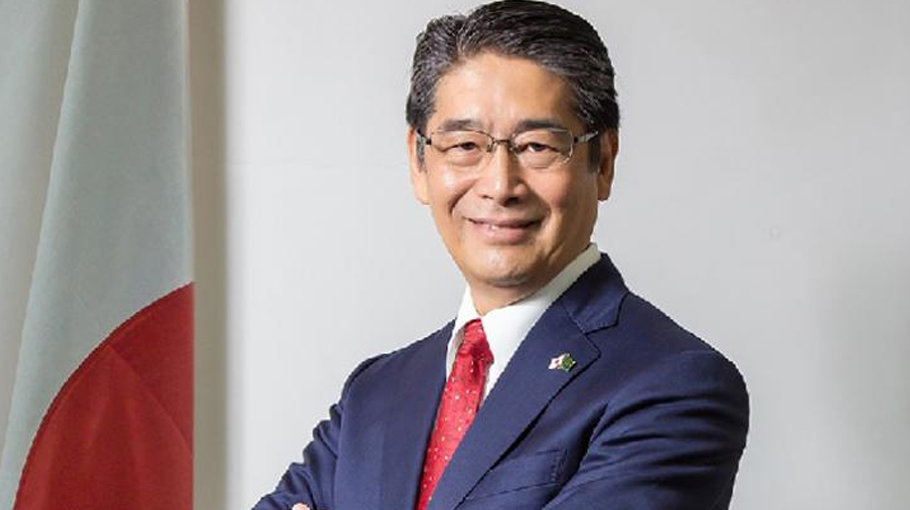Japan lauds Bangladesh’s Covid response

Japanese Ambassador to Bangladesh Naoki Ito on Thursday extolled Bangladesh's achievement in Covid-19 management under Prime Minister Sheikh Hasina's leadership and assured of supplying more doses of AstraZeneca vaccine in November.
“This is really a wonderful achievement. This is a great achievement and great effort by the government and its people," he said, while addressing the "DCAB Talk" of the Diplomatic Correspondents Association, Bangladesh at the Jatiya Press Club.
The daily Covid-19 positivity rate remained below 5 percent in Bangladesh for weeks with the vaccination campaign going on across the country.
Apart from vaccines, the ambassador also talked about the different aspects of bilateral relations including trade and investment, Rohingya crisis, and Indo-Pacific Strategy (IPS).
Since the need for vaccination goes on, he said Japan plans to provide vaccine doses further, mainly through COVAX anytime in November. He, however, could not specify the quantity.
He said Japan would also sign an exchange of notes to provide budget support focusing on the health sector. “It’s important that we join hands. Japan will continue to stand by Bangladesh.”
There is another project in the pipeline, he said, adding that by the end of this year or early next year they will be able to provide support for the ICUs and related facilities.
Japan, earlier, provided 3 million doses of AstraZeneca vaccine to Bangladesh.
The Ambassador said Japan is the most impactful development partner of Bangladesh and there is no doubt that the two countries have excellent political relations.
“We have not seen high level visits due to Covid pandemic but I am sure, there will be resumption of high level talks and exchanges,” he added.
On Japan's contribution to Bangladesh's large-scale infrastructure development, the envoy said the infrastructure situation will be very different with due transformation in five years’ time.
Ambassador Naoki hoped that the FDI flow from Japan would increase with increased trade volume and greater presence of Japanese cooperation. "We’ll step up our pragmatic cooperation," said the Japanese Ambassador.
On the Rohingya issue, he said it is very difficult to predict in which direction the situation is going. "Repatriation is very important. Japan will continue to raise the issue of repatriation with Myanmar," he said.
The international community needs to put pressure on Myanmar, he added.
Seeking sustained international pressure on Myanmar to achieve the goal of Rohingya repatriation, he said the signing of MoU between Bangladesh and the UNHCR to begin UN engagement in Bhasan Char will pave the way for even better cooperation and coordination on the Rohingya repatriation process.
“It’s very important that the international community puts pressure on Myanmar as part of the repatriation work. How? I think it depends on the individual country,” he said.
Responding to a question on how the international community can put pressure on Myanmar, the Ambassador said there has been pressure coming through UN resolutions which is of course one way while the other possibility is direct contact or direct representation.
“I would say Japan has been doing this by making use of the channels that Japan has established. So, we directly communicated with the Myanmar military side,” he said.
The Japanese envoy said Japan might not have played a very prominent role but he thinks Japan has been playing a very important role in its own way. “Japan has been doing what Japan can do. We will continue to do that.”
He said the humanitarian issue is a very important part when they endeavor to realize Free and Open Indo-Pacific that consists of three pillars including promotion and establishment of rule of law, freedom of navigation and free trade; pursuit of economic prosperity.
He said if the Rohingya situation becomes unstable the goal of peace and stability will not be achieved and that is why Japan has been trying very hard to address the Rohingya issue.
“If we can establish better cooperation and coordination between Bangladesh and the international community, we may get better approaches to deal with the situation,” he said.
He said his country will do its best to create an enabling environment for the early repatriation of Rohingyas and will continue to raise the issue with the Myanmar side.
Bangladesh is hosting over 1.1 million Rohingyas in Cox’s Bazar district and Bhasan Char.
Japan’s Rohingya-related humanitarian assistance in Bangladesh amounts to $159 million which supports the Rohingya people and host communities through international organizations and NGOs.
DCAB President Pantho Rahaman and its General Secretary AKM Moinuddin also spoke at the event.




